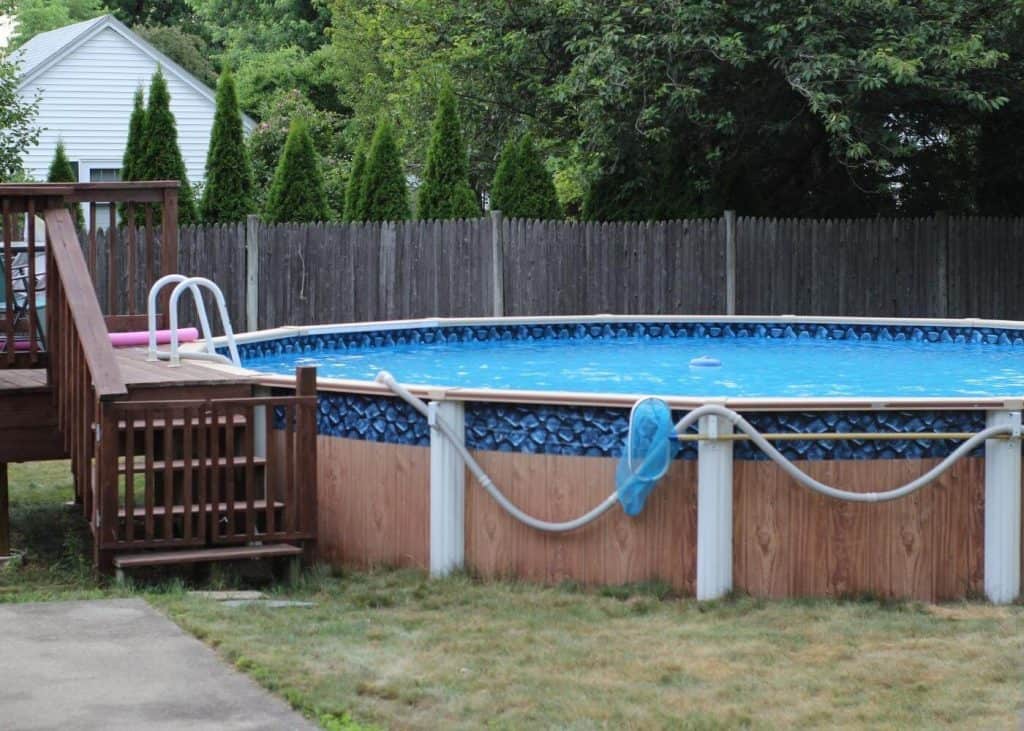We are reader supported, and may earn commissions from links on this page.
We all want our pool water to be as safe as possible, but there is a time where you need to know how to lower alkalinity in a pool.
When unclean water and calcium deposits are found, it can be a sign that the alkalinity is high.
We’re going to look at the various options in the following article.
Why do You need To Lower Alkalinity In Your Pool?

Alkalinity levels need to be optimal otherwise your pH level will become imbalanced. This results in high calcium levels.
These cause scaling, which can impact the working parts of the filter, clogging them up. Expect to find cloudy water that looks less than tempting when this happens.
Think of anyone who wants to swim in such a pool. Murky water is not tempting, but many are asking what this means for our health.
Is Alkalinity In Pool Dangerous?
So, what does high alkalinity in a pool mean for swimmers? Many will experience itchy eyes and skin. Keeping the optimal chemical levels in your pool is an art.
You will want to know how to lower alkalinity in your pool to ensure the chlorine is effective. With an imbalance of water chemistry, the sensitizing agents are not as effective. If these are not at optimal labels, the water is unhygienic and can be dangerous for swimmers.
You may also find that scaling starts to occur. When this happens, calcium deposits will be evident, and these can damage the pool equipment to the point where it is unsuitable. Repairs are more expensive than fixing alkalinity levels.
What Do You Need To Lower Alkalinity In A Pool?
A series of tools and chemicals are going to be important for reducing alkalinity.
Alkalinity Reducer
Starting with an alkalinity reducer. The following product reduces the likelihood of corrosion and uses granular sodium bisulfate to bring levels to where they should be.
Acid Blue Muriatic Acid
When you need to know how much muriatic acid to use in a pool, make sure you are using the following product.
Any pH reading of 7.8 or above, and an average 15,000-gallon pool will require a quart of muriatic acid. Always retest the levels shortly after.
pH Reducer
The following pH granular pH reducer is highly effective.
It should be used at a rate of 1.5 lbs per 10,000 gallons and will bring alkalinity levels in the pool water to an optimal level.
Swimming Pool Chlorine Bromine pH Alkalinity Test Kit
As always, you need to test the water to determine the cause of the murkiness.
To be sure of the number of chemicals you require, use the following pool water test kit.
Best Methods To Lower Alkalinity In Pool
If you want to know how to lower total alkalinity levels in a pool then you need to test the water first. Then, use muriatic acid.
It is inexpensive but effective enough to kill milk, get rid of calcium deposits, and remove rust.
Here is the process:
- First of all, turn off the pool pump and give it an hour to ensure the water has settled
- The alkalinity levels need to be below 120ppm so read the instructions on the bottle to determine how much muriatic acid is needed.
- Because brands will use different strengths, find out if the one you are using needs diluting and follow the instructions before pouring the required amount into the deep end.
- Leave the water alone for an hour
- Turn on the pumps and leave them on for 5 hours to move the muriatic acid.
- Put the pumps back onto the optimal settings before testing again to be sure.
There are other methods, including other chemicals.
But how much sodium bisulfate to lower alkalinity in a pool?
Use 3.5 oz to reduce alkalinity by 10ppm per 1,000 gallons of water.
How To Prevent High Alkalinity In Pool?
The easiest way of preventing high alkalinity is to stay on top of the pH levels. With regular testing, there should never be a build-up of calcium deposits, and no one should suffer from itchy eyes.
Test the water twice a week, especially in summer, and stay on top of the chemical levels. This is the same if you want to know how to lower alkalinity levels in above ground pool.
How To Lower Alkalinity in a Saltwater Pool?
These tend to be more susceptible to scaling because of the corrosive salt.
Use muriatic acid to help lower alkalinity using the same method we have already mentioned.
How To Lower Alkalinity In Pool Naturally?
A home remedy for lowering alkalinity in a pool is to use distilled water.
Because many areas have hard water, which is higher in alkalinity, it will be difficult to do, as it means getting it from inside your home into the pool, but it is an option.
Conclusion
So, now you know how to lower alkalinity in a pool, it is a quick fix.
Keep those optimal pH levels between 7.2 and 7.8 and you will have clean, hygienic water to enjoy throughout the summer.
Related Pool Reviews:
Beat the summer heat and keep cool
There’s an above ground pool set to suit your budget and the size of your yard.
Let us help you find the best pool for you!




